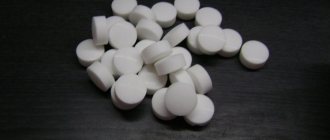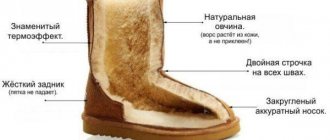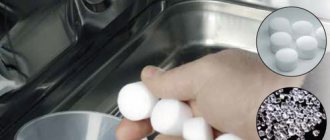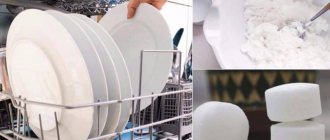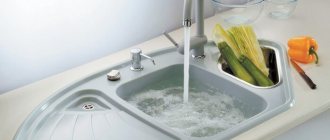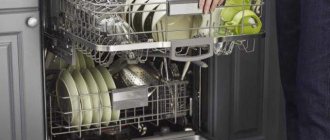The composition of decalcifying salt for dishwashers consists of sodium chlorine, better known as table salt.
There are known cases of replacing special salt with regular salt in order to save money. But special is a product that is very carefully purified from impurities and additives.
Regular salt contains a lot of sand and other sediments that can clog the filter channels of the unit.
The second distinguishing feature of dishwasher salt is that the granules are much larger. Thanks to this structure, during the washing process they dissolve evenly and do not bunch up into one continuous lump.
Therefore, dishwasher manufacturers discourage the use of regular salt.
How does salt work in a dishwasher?
Dishwasher salt is necessary because:
- softens hard water;
- prevents the formation of scale and limescale on the internal parts of the machine;
- There are no streaks on the dishes when washed this way.
A salt solution is necessary for the proper operation of the ion exchanger, which works to soften the water.
Many dishwashing machines have sensors that monitor the presence of salt in the ion exchanger. When the sensor signals that there is no salt in the tank, several washing cycles can be carried out without replenishing the corresponding compartment.
The amount of salt consumed is proportional to the hardness of the water: the harder it is, the greater the consumption.
1st option - table salt
Let me note right away that I do not recommend using substitutes and analogues during the warranty period. Otherwise, you may be left without a warranty and free service, even if the problem is not caused by the quality of the salt. If the service center discovers that you used the wrong composition, the warranty will be void.
When it comes to regular table salt, there are three main options.
Option 1. Table salt
| |
Option 2. Variety “Extra”
| |
Option 3. Sea salt
|
Let's see how to use this option:
- Pour about 50 grams into a glass. salt and add 100 g. water . Stir until the crystals are completely dissolved. Carefully inspect the liquid - if it is clean, then the option is suitable for the dishwasher, but if it is cloudy and there is sediment at the bottom, then it is better not to use this solution.
- Once you have decided what salt to put in the dishwasher, choose how to use it. The easiest way is to pour the composition as is. Fill no more than a third of the container’s volume, so the layer will not harden and will be better washed out of the ion exchanger.
- You can use an aqueous solution, the proportion of components is 1:1 . This prevents petrification of the layer, but the composition will have to be added more often.
What can be replaced?
However, the special composition is 10 times more expensive than regular table salt.
The consumer asks the question: “What to replace?”, and social networks are filled with advice from users who have “tested” the effect of so-called substitutes on their units.
Special regenerating salt for the dishwasher can be replaced with regular NaCl.
But at the same time, the replacement must be a very high-quality pure product, which contains a minimum of impurities. Then the dishwasher will not be harmed.
Table salt is often saturated with moisture-absorbing substances (for example, gypsum powder), which are completely safe for humans, but harmful for the dishwasher.
How to determine the purity of salt?
To do this, you need to dilute a portion of salt with water until a saturated solution is obtained. The proportion is approximately 1:1.
If this solution is clear and not cloudy, this product can be used to wash dishes in a machine.
Replacement options
Dishwasher salt, what is it? The answer that immediately comes to mind is a substance based on the sodium-chlorine compound. Therefore, the first option that users offer to replace special salt is regular table salt. In addition to table salt, some try to use the following as substitutes:
- sea salt;
- tableted salt;
- 3 in 1 tablets.
Table and sea salt
Table salt, also called table salt or rock salt, can have different compositions. Everything will depend on the conditions and methods of extracting raw materials. And this is clear from the appearance of the substance. Some salt is fine, others are coarse, some are very white, others have a grayish tint, and sometimes even gray grains of sand. But 96-97% of any table salt consists of sodium and chlorine. In addition, it may contain: potassium, calcium, magnesium, clay, iron boron, manganese, iodine and other substances, as well as food additives, for example E536.
This composition of table salt suggests that its use in the dishwasher may not be safe. Various impurities will settle in the ion exchanger, which will lead to its rapid wear and breakdown.
Important! If you need to replace special salt, then you need to choose salt of the highest class of processing without any additives, and not iodized. For example, this type of salt includes “Extra” salt.
Dishwasher users are divided into supporters of using “Extra” salt and opponents of replacing special salt. Supporters say that nothing happens to the car, and that 1 kg of such salt is enough for exactly the same amount as 1 kg of special salt. Opponents do not see any point in replacing salt at all, since it lasts for a long time. And for a year of using the car, this is not a lot of money and it’s not worth taking risks in this case.
Sea salt is similar in composition to food salt, but it contains even more different impurities, more than 80 minerals. It undergoes minimal processing and cleaning, so this salt is definitely not suitable for the dishwasher.
Tablet salt
As for tableted salt, it comes in different forms. This can be a special regenerating salt, but it is produced not in granules, but in tablets. But there is also tableted table salt, for example “Mozyr Salt Universal”. Tablets are made based on extra table salt “Polesie”, which does not contain the additive E536. The price for 25 kg of such salt is 350-400 rubles, and it will last for about 2 years, there is a significant saving.
3-in-1 tablets
And finally, 3-in-1 tablets for dishwashers, this cannot at all be called an option for replacing salt for a dishwasher, since this is a full-fledged set of products necessary for it. The tablet consists of several layers, each of which has a certain time to dissolve in water:
- the first and second layers are detergent and salt, they dissolve during the heating of water;
- the next layer is neutral - it dissolves during the first rinse;
- The last layer is rinse aid, which dissolves during the last rinse of the dishes.
The 3-in-1 product can be used instead of all products at once, and there is no need to pour salt into the compartment. However, dishwasher users note that with a long dishwashing cycle, the tablet dissolves normally, but with short cycles, the powder does not always dissolve, which leads to it getting into the rinse water.
For your information! You should not crush 3-in-1 tablets into powder, this will lead to the fact that the rinse aid will dissolve during the dishwashing process and will be of no use.
What are the dangers of salt substitutes?
If you still use an alternative to dishwasher salt, then you need to know this:
- While the warranty is valid, there is no need to replace special compounds with anything.
- Use only highly purified “Extra”.
- A replacement product is added immediately before the unit is started. If you put it in reserve, the salt will act on the metal surfaces of the car for a long time, which will most likely cause rust. Special formulations with large granules are poured once a month.
- Before adding to the tank, the salt is diluted with water so that a lump does not form.
2nd option - tableted salt for softener filters
You can replace the salt with this option.
Step 1. Purchase the composition
| |
Step 2: Fill the dishwasher with tablets
| |
Step 3. If you do not intend to use a special option, then use tablets
Is it possible to replace the special option completely? Yes, if you use tablets |
Can I use table salt?
Table (edible or rock) salt can have different compositions. It depends on the conditions under which the salt was extracted and what methods were used for this. Just by looking at salt, you can understand that it can have different compositions. Externally, it can be small, large, white or even gray. However, the main components of any salt are sodium and chlorine.
The composition of ordinary salt suggests that it should not be used in a dishwasher. It may be dangerous. Due to the fact that it produces sediment, the dishwasher may break down.
Functions of salt in the dishwasher
The quality of water in most regions of Russia leaves much to be desired. Apartment owners prefer to install filters on water pipes, but they do not always save the situation.
You can determine water hardness by the appearance of the taps in the bathroom and kitchen. White deposits indicate excessive limestone content. Tap water contains a certain amount of calcium ions. When heated, it precipitates, gradually compressing into a thick coat of scale.
If you use tap water for boiling without filtering, the kettle will quickly become covered with scale from the inside. The same thing happens with heating elements in a dishwasher. The heating tube spends more electricity to heat the water, and at a certain point, under the influence of too high a temperature, the spiral burns out.
Most PMMs are equipped with a built-in ion exchange filter with a resin consisting of sodium chloride. Water passes through it, and magnesium and calcium ions with a positive charge are deposited on the resin particles. The water is saturated with sodium ions with a negative charge and becomes softer.
The resin loses its original properties over time and needs to be regenerated with sodium chloride. The dishwasher's ion exchanger is equipped with a salt container. The salt presence indicator signals that it is time to replenish the amount.
Attention! The degree of salt consumption for one washing cycle is set in manual or automatic mode, depending on the hardness of the water.
The water softener adjustment is located on the dishwasher lid. Most models provide the ability to set 7 levels: 0 – soft water, 7 – hard water. The level is determined depending on the amount of combined detergents and water quality.
To set the correct mode, evaluate the water quality:
- get information from the Internet depending on the region;
- use indicator strips;
- wash your hands with ordinary laundry soap - if the foam is washed off quickly - the water is hard, if it takes a long time - soft;
- visually assess the presence of plaque on plumbing fixtures.
Reference. Sodium cationization is a chemical process of exchanging sodium ions for magnesium and calcium ions, which affect water hardness. As sodium ions are depleted, they are added to the water to restore the ion exchange resin.
Functions of sodium salt for dishwasher:
- softening water for washing;
- restoration of sodium reserves in the ion exchanger;
- decomposition of scale on metal elements;
- improving the quality of washing;
- protection of dishes and the human body from the negative effects of lime deposits.
What can you use instead of special salt?
Since the composition of special salt is identical to table salt, many believe that it can be used as a substitute for a special product. There is some truth in this, but not much. Everyone knows that any salt consists of approximately 96.5% sodium chloride. The remaining 3.5% may be compounds of potassium, calcium, iron, boron, etc. If you use salt as a food additive, its composition does not play a special role. But not as a dishwasher detergent! Those impurities that are usually included in salt will settle in the ion exchanger along with sodium chloride and then it will be impossible to replace them.
So, it is recommended to use only high-quality cleaning products for your dishwasher. You can use “Extra” salt, but in no case iodized salt. There are also special 3-in-1 tablets. This product consists of:
- in the first layer - detergent and sodium chloride;
- in the second - a neutral mixture;
- in the third - rinse aid.
It is very convenient to use such tablets, because they contain so much at once.
